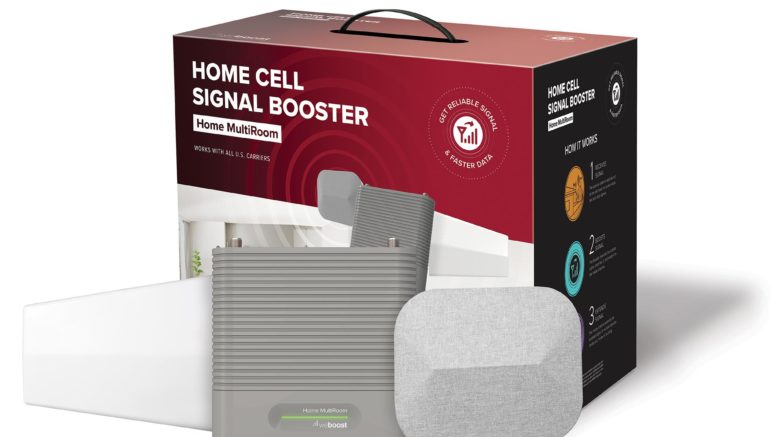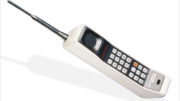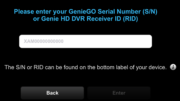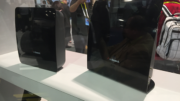I can’t tell you how many times I’ve said it: your phone is your most prized possession. It’s the thing you get most nervous about if you leave it at home. It’s not so much the phone hardware, it’s the access that it represents. If you can’t check your socials, read your emails, and yes occasionally take voice calls, you feel disconnected. No one wants that, especially today.
Even when you have your phone with you, you might struggle to connect. You might be an area with a “dead zone.” If it’s somewhere you’re just visiting, it’s not a big deal. You just keep walking. But it’s a real pain when it’s at home or in the office.
Luckily there’s a solution for cell phone dead zones. It’s called a cell phone signal booster, and you’ve probably heard about it. But, you might have heard two things that have stopped you from buying one and putting it up yourself (even though it’s super-easy to do.)
You might have heard that cellular boosters don’t work.
Let me be clear. External antennas that go into your phone’s headphone jack don’t work. Stickers on the back of your phone don’t work. Real cell boosters do. Simple as that. This is a proven technology that’s been around for decades and it works using one simple principle. Cell signal from outside is captured using a larger antenna and brought inside using a wire. It’s then amplified and pumped out to your phone wirelessly. Simple as that.
You might have heard that you have to register your cell booster
This part is true. Because of the way cell boosters work, you must register yours with a cell carrier. (Technically, it doesn’t have to be your carrier.) This rule isn’t really enforced but it is a rule nonetheless. If you’re the sort of person who follows rules, you’ll want to know about it.
It’s not a big conspiracy but it is true. Every cellular signal booster sold in the US since 2014 requires approval not only from the FCC but from the cellular carrier you’re using it with. This is part of a compromise that was reached where the phone companies stopped claiming that a cell booster would break your phone and started agreeing it was ok to use them.
This doesn’t give the government the right to spy on you. It doesn’t give them some sort of special ability to listen to your calls. Essentially it puts you into a database and I hate to break this to you, your personal information is probably in a hundred databases at this point.
Here are the details
If you see this information on the box:
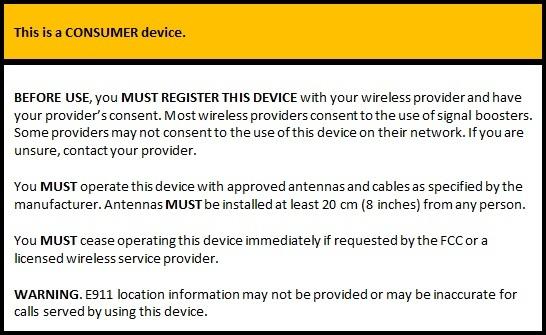
That means that the cell booster has been pre-approved by 30 of the largest cellular carriers so all you have to do is notify them that you’re using it. By law, they have to let you do this for free. If your cell carrier isn’t one of the 30 largest then you might have to take an extra step or two.
All the boosters sold by Solid Signal are already carrier-approved.
The process should be very straightforward, just go to your local store or call your customer service department at the cell carrier and tell them what you’re doing. Be prepared to fill out a form that gives the model and serial number. This doesn’t give the carrier the right to snoop on your calls so it’s perfectly harmless.
You can also go straight to carrier web sites. As I said, it doesn’t have to be the carrier you actually use. For your convenience, here are some carrier links:
- T-Mobile/MetroPCS: https://www.t-mobile.com/support/coverage/register-a-signal-booster
- Verizon: https://www.verizon.com/solutions-and-services/accessories/register-signal-booster.html (this link didn’t work when I tried it but it has worked before)
- AT&T: https://securec45.securewebsession.com/attsignalbooster.com/
- U.S. Cellular: http://www.uscellular.com/uscellular/support/fcc-booster-registration.jsp
Get a cell phone signal booster from Solid Signal
Whether you’re in a car, boat, RV, truck, or at home or office, buying and installing a cell phone signal booster is incredibly easy. Just shop the great selection at Solid Signal. What if you have a gigantic space to work with? What if you have questions about which booster you need? No problem! We’re a company that actually answers the phone. Call us at 888-233-7563 during East Coast business hours. If it’s after hours, fill out the form below. We’ll get back to you, usually within one business day.

